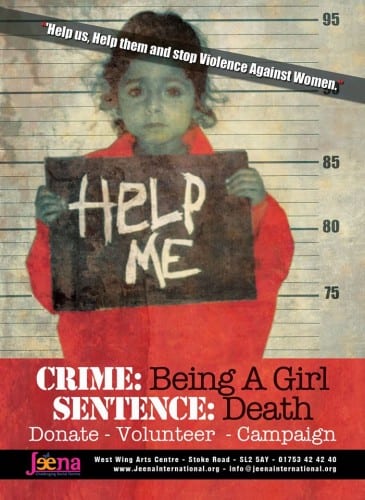

 SLOUGH, UK—Jeena International are to launch a campaign on gender-selective abortions in the UK.
SLOUGH, UK—Jeena International are to launch a campaign on gender-selective abortions in the UK.
The Slough-based women’s empowerment charity, established by Rani Bilkhu, tackles cultural issues within the South Asian community including domestic abuse, honor based violence, forced marriage, female genital mutilation, sexual grooming and violent extremism.
In 2010, the organisation produced and launched a short film, “From the Beginning,” to encourage discourse around the sensitive topic of gender-selective abortion through drawing attention to the deep rooted cultural gender bias which finds expression in many South Asian families.
Now, Jeena are launching a multi-faceted campaign on gender selective abortions. The campaign has both a social and political dimension, aiming not only to raise awareness and change social attitudes within the South Asian community, but also to encourage parliamentary activity and the establishing of secondary legislation clarifying the illegality of abortions based on gender, through the creation of an All Party Parliamentary Group (APPG).
With new technology making it easy to detect female foetuses, sex selective abortions have risen considerably. The British Medical Journal (Sen, 1992) reflected the huge deficit of women in areas of Asia as the result of the cultural gender bias, with a staggering 37 million women estimated to be missing in India. A revisiting of this study 11 years later found that, while infanticide has decreased, it has been counterbalanced with the use of gender-selective abortions.
Research has revealed the prevalence and relative ease of gender-selective abortions within the UK, provoking significant shifts in the natural sex-ratio of South Asian communities in favor of boys. Up to 4,700 unborn girls are estimated to have been deliberately aborted, following an analysis of the 2011 national census figures which revealed that in some areas of Britain, the proportion of boys born compared to girls is much higher than the natural rate.
The topic of sex-selection abortion, however, has not received due attention within the affected communities. For Rani Bilkhu, the abortion debate are irrelevant to the issue. This is a case of devaluing women, or something Rani Bilkhu terms “womb terrorism;” violence against women before they are born.
While the practice of gender-selective abortion are not exclusive to the Sikh community, figures have shown that Punjab has the lowest number of women to men ratio (Sen, 2003: 1-2), indicating that “Sikhs” are at the focal point of the issue. This is despite the teachings of Sikhism and the Guru’s attempts to uplift women from the position they found themselves in within patriarchal society, condemning those practices which did not coincide with the ideal of equality and specifically challenging negative perceptions of girls and women, without whom there could be no man or woman (Shiri Guru Granth Sahib Ji: 473). Further, the killing of a daughter was specifically condemned by the tenth Guru, Shiri Guru Gobind Singh Ji, and is condemned by the Sikh Rehat Maryada (Code of Conduct).
As such, Sikhs and all people committed to equality have a responsibility to encourage discourse around the issue and to challenge the gender bias that has been instrumental in the devaluation of women through generations. It finds expression through preferential male treatment, through the celebration of the birth of a boy, for example, while girls are still viewed as financial burdens.
Jeena urge all women to contact the organisation if they feel that they have experienced either community imposed or self imposed pressure in relation to having boys or having abortions, and those who are victims of abuse because they have had girls.
T: 01753 424 240
E: [email protected]




